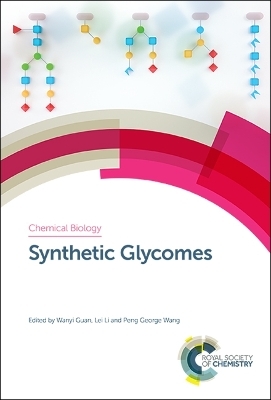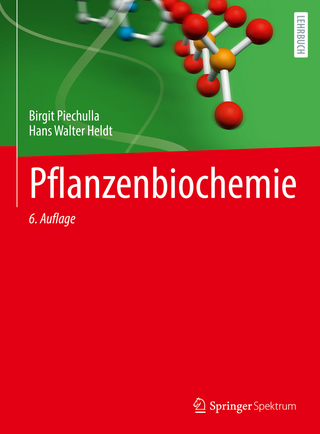
Synthetic Glycomes
Royal Society of Chemistry (Verlag)
978-1-78801-164-8 (ISBN)
Glycans play essential roles in diverse biological and etiological processes and their structural complexity endow various functions. The glycome is the entire set of glycans produced by an individual organism. As the glycan microarray emerged, a good amount of knowledge has been obtained in understanding the functions of glycans. However, limited accessibility of glycans is a major obstacle to the functional glycomics study. Although isolation from biology samples provided some structures, the low abundance of glycans obtained and the difficulty in complete structural assignment restricted the subsequent assay. To circumvent this limitation, many synthetic strategies, including chemical, enzymatic and chemo-enzymatic ones have been developed to make libraries of structurally defined complex glycans available. The glycans provided by these techniques combined with high-throughput glycoarray techniques have broadened and deepened our understanding about functional glycomics. The aim of this book is to provide a comprehensive review of the current state of the synthetic glycome and a brief introduction of the application of the synthetic glycome in glycoarray assay. Accordingly, synthetic strategies toward generating glycans with comprehensive structures as well as the glycoarrays to unveil the glycan functions are described in this book.
Wanyi Guan is an associate professor in the College of Life Science, Heibei Normal University, China. She received her PhD from Shandong University in 2011 in Microbiology and Glycobiology. During her joint PhD program at Ohio State University, she focused on substrate specificity study of enzymes involving in salvage pathway of UDP-GlcNAc/UDP-GalNAc synthesis, large-scale chemoenzymatic synthesis of UDP-GlcNAc/UDP-GalNAc and their analogs, as well as the application of the sugar nucleotide analogs. She joined the faculty of College of Life Science, Hebei Normal University, China in 2011 as a lecturer, and was promoted to associate professor in 2013. Dr Guan is currently a postdoctoral research fellow in Department of Chemistry, Georgia State University. Her research interests involve the isolation of abundant glycans from natural sources, and enzymatic synthesis of glycans with glycosyltransferases (especially mammalian glycosyltransferases whose functions are unique from bacterial glycosyltransferases). Lei Li is a research assistant professor in Department of Chemistry, Georgia State University. He received his PhD from Shandong University in 2010 in Microbiology and Glycochemistry. As a joint PhD student at Ohio State University, he carried out biochemical characterization of the lipopolysaccharide biosynthetic pathway of E. coli O86, and basic research on bacterial N-glycosylation pathway, and using involved glycosyltransferases to synthesize natural and non-natural glycans. Such work had resulted in several peer-reviewed publications. At Nankai University as a PI, he had successfully administered (including staffing, research protections, budget) two projects (supported by NSFC and CPSF of China), collaborated with other researchers, and produced publications from each project. After that, since 2013, Dr Li has been working on developing facile strategies for rapid access of complex human glycans, such as N-glycans and O-glycans. This work had already resulted 5 peer-reviewed publications, in which we developed efficient approaches for chemoenzymatic synthesis of sugar nucleotides, sialiodases and importantly, an N-glycan isomer library (73 N-glycans). The technology is named “Chemical synthesis/Enzymatic extension” (CSEE). Based on the successes on using CSEE, they applied and were awarded an NIH common fund for Glycoscience to developed facile ways to access complex O-glycans and glycopeptides.
Introduction: Glycome and the Glyco-toolbox;
Methodologies in Chemical Syntheses of Carbohydrates;
Synthetically Useful Glycosyltransferases for the Access of Mammalian Glycomes;
Chemical Synthesis of N-Glycans;
Chemoenzymatic Synthesis of N-glycans;
Chemoenzymatic Synthesis of α-Dystroglycan O-Mannose Glycans;
Chemical Synthesis of Glycopeptides and Glycoproteins;
Synthesis of Chondroitin Sulfate Oligosaccharides and Chondroitin Sulfate Glycopeptides;
Chemoenzymatic Synthesis of Heparan Sulfate and Heparin;
Synthesis of Glycosphingolipids (GSLs);
Enzymatic and Chemoenzymatic Synthesis of Human Milk Oligosaccharides (HMOS);
Synthesis of Marine Polysaccharides/Oligosaccharides and Their Derivatives;
Glycan Production by Bacterial Fermentation;
Solid-phase Glycan Synthesis;
Reverse Synthesis of Natural Glycans;
Novel Technologies for Quantitative O-glycomics and Amplification/Preparation of Cellular O-glycans;
Current Stage of Commercially Available Glycans to Support Realization of Biologic Drugs;
Glycan Microarrays with Semi-synthetic Neoglycoconjugate Probes in Understanding Glycobiology;
Current Stage of Commercial Glycan Microarrays
| Erscheinungsdatum | 24.04.2019 |
|---|---|
| Reihe/Serie | Chemical Biology ; Volume 11 |
| Verlagsort | Cambridge |
| Sprache | englisch |
| Maße | 156 x 234 mm |
| Gewicht | 891 g |
| Themenwelt | Naturwissenschaften ► Biologie ► Biochemie |
| Naturwissenschaften ► Biologie ► Genetik / Molekularbiologie | |
| ISBN-10 | 1-78801-164-3 / 1788011643 |
| ISBN-13 | 978-1-78801-164-8 / 9781788011648 |
| Zustand | Neuware |
| Haben Sie eine Frage zum Produkt? |
aus dem Bereich


